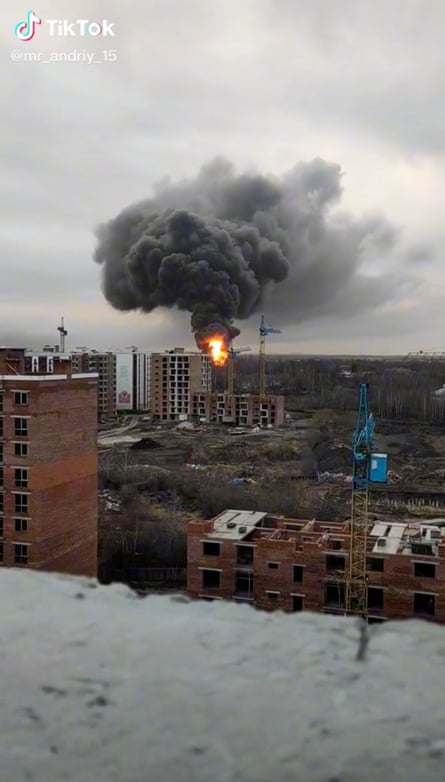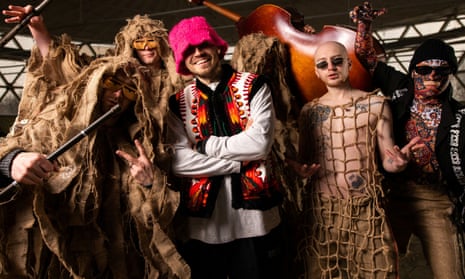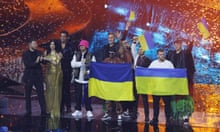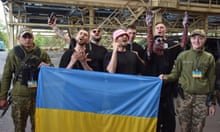In its 66 years of broadcasting, the Eurovision Song Contest has usually provided joy, hilarity and songs involving puppets of Irish turkeys. Set up with the noble intention of showing that music could unite Europe, it has instead been a glorious failure, with knock-off Slipknots, tone-deaf, bread-baking grannies and Israeli rappers squawking like chickens all emphasising, if anything, the impenetrability of a foreign nation’s favourite pop music – even when they’re singing in English.
Just in case you were wondering, after watching the performances, whether the continent’s borders were tumbling, outrageously partisan national voting usually confirms that the spirit of intercontinental togetherness is a mirage. Greece and Cyprus give one another douze points, the Scandinavian countries vote for each other, and poor old Eurosceptic Britain has spent most of the last decade in the bottom three places.
This year, however, things might be different. While nations competing in Eurovision have been at war before – bloody border disputes have erupted between Armenia and Azerbaijan for years, while Russia attacked Georgia in 2008 and invaded the Crimea region in 2014 – this time the mood against Russian’s invasion of Ukraine is resolute. After initially saying that Russia could compete, since the contest was apolitical, the organisers reversed their decision and banned the country.
“If they had been allowed to enter Eurovision this year, it would have symbolised the support of Russia’s actions,” says Oleh Psiuk, frontman of this year’s Ukrainian entry, folk-tinged hip-hop crew, Kalush Orchestra. “But now, I have the feeling of justice.”
For Psiuk and the rest of his six-man crew, this year’s song contest represents a unique opportunity. In the midst of an unprecedented threat to European security, he also sees an unprecedented desire for the continent to bond together. “I really believe that unity is important at the moment,” he explains via Zoom from the hotel room he’s staying in during a pre-contest promotional tour of Israel. “Our song has managed to unite so many Ukrainians and I hope that it will unite Europeans – and maybe the whole world.”
Back in February, Psiuk came second in his country’s Eurovision selection process with Stefania, a musical tribute to his mother. Then, in a surprise twist, following the withdrawal of the first-placed act due to an alleged visit to the Russian-occupied region of Crimea, he found out he was going to represent Ukraine in this year’s competition, which takes place in Turin, Italy. At which point, Russia invaded his nation, his song was adopted by his compatriots as a homage to their motherland, and now it soundtracks about 150,000 TikTok clips, from videos of worldwide #Standwithukraine protests to footage of rocket launchers being fired from buildings.
The groundswell of support around the act has seen the Ukrainian government grant them a special permit to travel to Italy, despite initial fears they’d have to perform via video link from a secure bunker, as a result of laws preventing young men from leaving the country. Kalush are now the overwhelming favourite to win this year’s competition – with the majority of the continent looking set to use their vote to make a statement about Russia’s aggression.
“It gives me a good feeling – it’s a nice thing to know,” says Psiuk – not that he thinks the Russian invasion is entirely responsible for his entry’s popularity. “Even before the war, our song was in the top five according to the bookies. This situation that has happened may have influenced the way that we have raced to the first position in the odds, but the fact is that we have a very good song – a great song, in fact.”
This is unprecedented territory for a contest that has previously had an extremely uneasy relationship with inter-European politics. For years, Eurovision’s organisers, the European Broadcasting Union (EBU), have maintained that it is an intrinsically anti-political spectacle – and have repeatedly stepped in to stifle the expression of opinions that challenge such a claim.

With the benefit of hindsight, it’s notable that these were often protest songs about Russian hostility towards its neighbours. The EBU banned the 2009 Georgia entry, We Don’t Wanna Put In for its less than subtle dig at Russia’s then prime minister, following the Russo-Georgian war. It had “anti-booing technology” installed to prevent the worldwide audience hearing the crowd’s protests against Russia’s 2015 entrant, following the Crimean invasion. And while, in 2016, it allowed Ukraine to enter a controversial competition-winning song about Russia’s deportation of the Crimean Tatar population in the second world war, the broadcasters were quick to condemn Ukraine as host the following year, when the country stopped the Russian contestant Yulia Samoilova from travelling to the final in 2017 due to claims she had “illegally” entered Crimea. Which the BBC’s Moscow correspondent suggested was possibly deliberate Russian provocation, or “precisely what Moscow wanted when it chose Samoilova, knowing that she had travelled to Crimea”.
It also puts Kalush Orchestra in a difficult position when it comes to articulating their feelings about their country’s plight. Just to travel to Eurovision this year, Psiuk has had to step away from the 35-person volunteering organisation he set up to provide access to safe accommodation, transport and medicine for refugees. Kalush Orchestra have had to find a replacement for a band member who is fighting in the Kyiv defence forces. But the band are driven by feelings that they had “an important mission” to raise awareness for their country – a feeling Psiuk has turned into something that sounds incredibly like a continent-rousing post-Eurovision acceptance speech.
“I have a message that I would like to deliver,” Psiuk says. “There are people who may see this conflict as a kind of a war film – something that is really far away and something that cannot happen to them. But it has already happened to us. We didn’t believe it beforehand, but it has actually happened,” he urges passionately.

“When you wake up every morning to the sound of explosions, when you wake up without being sure if your girlfriend or family are alive, this is scary – really scary. So I would like to urge everyone to support Ukraine, to find the time to think about what they can do to help Ukraine in this situation. If everyone in the whole world does what they can, then we can end this war much sooner – and prevent it happening again in another country.”
Nonetheless, even if Ukraine were to win, Psiuk’s not sure that the rules around overtly political statements would ever allow him to actually say these words. “We want to avoid any kind of politicisation, and that is why we would first of all discuss it with the team before doing anything,” he explains.
Another big question lies around what the distribution of votes might look like this year. In a continent that’s being swept by a new spirit of collaboration, might we see a shakeup of the entrenched system of douze points allocation? Could there be an end to the Scandi, Balkan and ex-Soviet voting blocs?
Apparently so, given the UK’s prospects. We look set to finish in the top 10 for the first time in 13 years – after having been the bottom-placed nation for the last two. Sam Ryder, the TikTok star who is this year’s entry, is currently fourth favourite to win, hopefully bringing an end to the years’ of UK complaints about political voting by the likes of ex-contestant Simon Webbe, who explained his sluggish pop stomper’s 11th-place finish in 2011 with: “It’s often not really about the song, but who your neighbours are.”

There is, of course, a limit. It might be a bit much to expect Turkey and Greece to end the culture war they’ve been fighting over the ownership of Cyprus via the Eurovision voting board for four decades. And given that in 2009, Azerbaijani state police rounded up citizens who had voted for Armenia, it seems unlikely that every country’s citizens will be voting with their musical taste alone.
But, for Psiuk, there’s a feeling that this contest might represent a once-in-a-generation chance to rethink petty European rivalries and for the continent to come together through song like never before. “For Ukraine, this is the most important year ever for Eurovision. And I would really like it to be true for the whole world as well, he says, as he prepares to end the Zoom call. “That’s why we’re bringing the world a message I would put in one word: love.”
It’s a lovely reminder of the competition’s importance, but one that’s not surprising. After all, in the middle of a country torn apart by war, the feeling that they’re backed by their neighbours might be the most important thing they could possibly dream of. Well, almost. “Most of all we would like to have victory at the main frontline. But at this moment, any victory is meaningful and important.” Luckily, Eurovision voters can make at least one of these things happen this year.










Comments (…)
Sign in or create your Guardian account to join the discussion